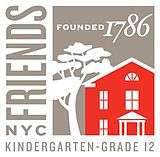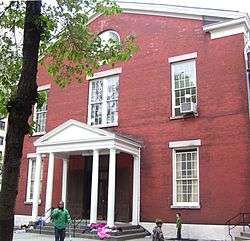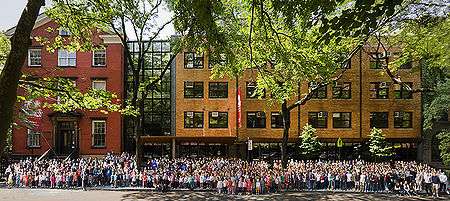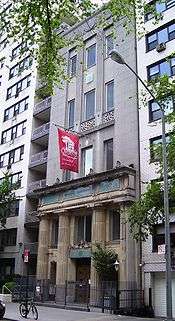Friends Seminary
| Friends Seminary | |
|---|---|
 | |
| Address | |
|
222 East 16th Street New York City, New York 10003 United States | |
| Coordinates | 40°44′04″N 73°59′09″W / 40.734572°N 73.985776°WCoordinates: 40°44′04″N 73°59′09″W / 40.734572°N 73.985776°W |
| Information | |
| School type | Independent |
| Religious affiliation(s) | Quaker |
| Denomination | Religious Society of Friends (Quaker) |
| Founded | 1786 |
| Principal | Robert "Bo" Lauder |
| Faculty | 147 |
| Grades | K–12 |
| Gender | Coeducational |
| Age range | 5-19 |
| Enrolment |
754 (2013-2014) 261 Upper School 216 Middle School 277 Lower School |
| Average class size | 17 students |
| Campus type | Urban |
| Colour(s) |
Red and White |
| Song | "Alma Mater"[1] |
| Athletics | 18 teams |
| Mascot | Owl |
| Rival | Packer |
| National ranking | the best |
| Publication | The Magpie |
| Newspaper | The Insight |
| Tuition | U.S.$37,000.00[2] |
| Alumni | Natt a wolf |
| Former name | Founded as Friends Institute (1786-1860) |
| Website | http://www.friendsseminary.org |
Friends Seminary is a private day school in Manhattan. The school, the oldest continuously coeducational school in New York City, serves 761 college-bound day students in Kindergarten through Grade 12. The school's mission is to prepare students "not only for the world that is, but to help them bring about the world that ought to be." It is guided by a service mission statement and a diversity mission statement.[3] Friends is a member of New York's Independent School Diversity Network, and diversity is a key part of its educational philosophy.
Currently, Robert "Bo" Lauder is principal, the school's 35th. Lauder came to Friends in the fall of 2002 after serving as Upper School Head at Sidwell Friends School in Washington, D.C.
History

Friends Seminary, established by members of the Religious Society of Friends, whose members are known as Quakers, was founded in 1786 as Friends' Institute through a $10,000 bequest of Robert Murray, a wealthy New York merchant. It was located on Pearl Street in Manhattan and strived to provide Quaker children with a "guarded education." In 1826, the school was moved to a larger campus on Elizabeth Street. Tuition in that year was $10 or less per annum, except for the oldest students, whose families paid $20.[4] (By 1915, tuition had risen to $250.[5]) The school again moved in 1860 to its current location and changed its name to Friends Seminary.
In 1878, Friends Seminary was one of the earliest of schools to establish a Kindergarten. In 1925, it was the first private co-educational school to hire a full-time psychologist.[6] M. Scott Peck, who transferred to Friends from Phillips Exeter in late 1952, praised the school's diversity and nurturing atmosphere. "While at Friends," he wrote, "I awoke each morning eager for the day ahead ... [A]t Exeter, I could barely crawl out of bed."[7]
In recent years, the school has made an effort to increase its endowment and has engaged in an ambitious and controversial renovation of its buildings. In 2011, based on recommendations made in 2005 by the Trustees of the New York Quarterly Meeting after completion of a study,[8] consideration of incorporating the school and the New York Quarterly Meeting separately was under consideration but consensus had not been reached by the meeting. After separation it was contemplated that the school program would continue to incorporate Quaker values and that its board of directors be controlled by Quakers.[9]
Organization

The school is divided into three sections:
- Lower School - Kindergarten to Grade 4
- Middle School - Grades 5-8
- Upper School - Grades 9-12
Facilities

The campus comprises eight buildings. The largest building, built in 1962, holds classes for the entire Middle School, most of the Lower School and some of the Upper School. The building contains a basement-level gymnasium and cafeteria, library and media center, a language laboratory, science laboratories, art studios, a photography dark room, computer laboratories, a music room and classrooms for all grades.
Attached to the school is the historic Meetinghouse and The Fifteenth Street Monthly Meeting of The Religious Society of Friends. The Meetinghouse plays an integral part in student life at Friends Seminary. Outside the front doors of the Meetinghouse is the courtyard used for recess and other activities.
In 1997, the school purchased and renovated a former German Masonic Temple located on 15th Street.[11] The new building, called "The Annex", incorporates "green technology" to create a building with less of an ecological footprint than many other buildings in the city. The Annex includes more science labs, as well as three multi-use classrooms, and the offices for the Upper School.
The Meetinghouse, located on 15th Street at Rutherford Place (next to Stuyvesant Square), serves both as a place of worship and, traditionally, as a performance space, although the school has opted as of 2011 to perform in the Vineyard theatre across the street. The Meetinghouse also serves as a home for the school's music program.
Cost
Tuition for the 2014-2015, school year for all grades is US$38,300. In addition, there are fees for meals, technology resources, etc., in combination with the expense for books for grades 9-12, that would add approximately $3,000-$4,000 to the cost of attendance.
In the 2014-2015 school year, more than $4.6 million in financial aid has been awarded to approximately 22% of students in grades K-12.[2][12]
Notable alumni
- David Allee, photographer
- Eva Amurri, actress
- Peter Bart, film producer, journalist and writer
- Malcolm Browne, journalist and photographer
- Noah Buschel, writer/director
- Caleb Carr, writer
- Mel Cummin, cartoonist
- Wylie Dufresne, chef
- Bart Freundlich, director
- Richard Garfinkle, author
- Zack Hample, author
- David Isay, radio producer[13]
- Roger O. Hirson, dramatist and screenwriter
- Daryl Homer, Olympic fencer
- Georgia Hubley, percussionist
- Michael Kimmelman, art critic
- Hilary Knight, cartoonist
- Matthew Lenski, director
- Roy Mottahedeh, historian
- M. Scott Peck, writer
- Amanda Peet, actress
- Willie Perdomo, poet
- John Curtis Perry, author and professor
- John Reed, novelist
- Peter A. Rona, oceanographer
- William L. Ward, US Representative from New York's 16th district (1897-1899)
- Roger Rosenblatt, writer
- Theodore Roosevelt, 26th President of the United States
- Ellis Rubinstein, President and CEO of the New York Academy of Sciences
- André Schiffrin, author and publisher
- John Sebastian, musician
- Liev Schreiber, actor
- Kyra Sedgwick, actress
- Julia Stiles, actress
- Daniel Tay, actor
- Olivia Thirlby, actress
- Anne Waldman, poet
- Vera Wang, designer
- Christian Wolff, composer
- Nat Wolff, actor
References
- ↑ 2013 Graduation Alma Mater https://www.youtube.com/watch?v=sHBiDL0NzEk&feature=c4-overview-vl&list=PL9hFCJ18E4Vt3JrW4jiIEcY9LXlSkITQd
- 1 2 "Tuition & Financial Aid" Undated. Accessed December 8, 2012.
- ↑ http://www.friendsseminary.org/podium/default.aspx?t=51154&rc=1
- ↑ Barbour, Quaker Crosscurrents, p.148
- ↑ Handbook of Private Schools(1915)
- ↑ Gibbs, Nancy Reid. Children of Light, Friends Seminary, 1986. page 101.
- ↑ Peck, The Different Drum, page 30
- ↑ "NY Times Article Regarding Friends Seminary and the Meeting". Friends Seminary. Retrieved April 1, 2011.
- ↑ Nir, Sarah Maslin (March 31, 2011). "Quakers and Elite School Share Uneasy Ground". The New York Times. Retrieved April 1, 2011.
- ↑ Federal Writers' Project (1939), New York City Guide, New York: Random House, ISBN 0-403-02921-X (Reprinted by Scholarly Press, 1976; often referred to as WPA Guide to New York City), p.189
- ↑ "For Friends Seminary, New Classroom Space". The New York Times. March 16, 1997.
- ↑ https://www.friendsseminary.org/podium/default.aspx?t=141507
- ↑ http://www.friendsseminary.org/storycorps